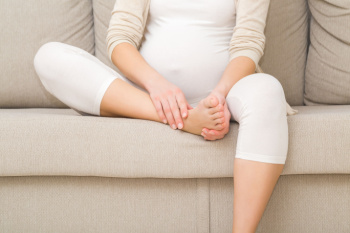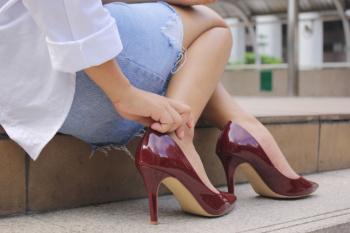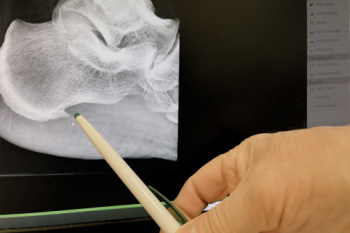Connect With Us
Blog
Items filtered by date: March 2024
Foot Protection Is Important in Every Workplace

Foot protection is an often overlooked but critical aspect of workplace safety across various industries. Regardless of the job type, from construction sites to office environments, feet are susceptible to many hazards that can lead to injuries and discomfort. In industrial settings, heavy machinery, falling objects, and sharp materials pose significant risks to foot safety. Properly fitted and durable safety footwear can mitigate these dangers by providing impact resistance and shielding against punctures and crush injuries. Even in office settings, where the risks may seem minimal, slips, trips, and falls can result in painful foot injuries. Wearing comfortable and supportive footwear can help prevent these accidents and promote overall well-being during long hours of standing or walking. Employers play a pivotal role in ensuring that appropriate foot protection measures are in place, including providing employees with access to quality safety footwear and enforcing safety protocols. If you are seeking additional information about what type of foot protection to wear for your profession, it is suggested that you consult a podiatrist.
While working on the feet, it is important to take the proper care of them. For more information about working on your feet, contact one of our podiatrists from Tri-Town Podiatry. Our doctors will treat your foot and ankle needs.
Working on Your Feet
Standing on your feet for long periods of time can cause stress and pain in your feet. Your whole body may experience change in terms of posture, back pain, bunions, callouses and or plantar warts. There are ways to avoid these conditions with proper foot care, smart choices and correct posture.
Positive Changes
Negative heeled shoe – Choosing this shoe type places the heel slightly lower than the ball of the foot. These are great for overall foot health. Find shoes that fit you correctly.
Go barefoot – Our feet were not designed to be enclosed for all hours of the day. Try to periodically expose your feet to air.
Eliminate Pain
Foot Exercises – Performing simple exercises, incorporating yoga and doing stretches are beneficial. This will allow increased blood flow to the area and muscles of the foot.
Achilles tendon – Stretching the foot out flat on the floor will relax the calf muscles and tendon. These exercises can be performed almost anywhere. Make sure you add these exercises to your daily regimen.
With a little bit of this information and knowing more about foot health, you will notice changes. Foot stretches and proper footwear will help with pain and prevent further issues.
If you have any questions please feel free to contact our offices located in Arlington, Canton, and Chelsea, MA . We offer the newest diagnostic and treatment technologies for all your foot and ankle needs.
Pregnancy and Foot Discomfort

Pregnancy is a journey filled with excitement and anticipation, but it can also bring its own set of challenges, including foot pain. Expecting mothers often find themselves dealing with discomfort and swelling in their feet, making each step a bit more challenging. However, there are ways to manage this discomfort and make the journey smoother. This can begin with investing in comfortable and supportive footwear. Opt for shoes with low heels and ample cushioning to provide relief to your tired feet. Additionally, elevating your feet whenever possible can help reduce swelling and alleviate pressure. Another helpful tip is to incorporate gentle exercises into your daily routine, such as walking or swimming, to improve circulation and strengthen your feet and ankles. Remember to stay hydrated and maintain a balanced diet to support overall health and reduce swelling. Lastly, do not hesitate to seek support from your podiatrist if foot pain becomes severe or persistent. This type of doctor can offer personalized advice and recommend safe treatment options to help you manage foot pain effectively throughout your pregnancy, If you are experiencing any foot discomfort during your pregnancy, it is suggested that you consult a podiatrist who can provide you with relief options.
Pregnant women with swollen feet can be treated with a variety of different methods that are readily available. For more information about other cures for swollen feet during pregnancy, consult with one of our podiatrists from Tri-Town Podiatry. Our doctors will attend to all of your foot and ankle needs.
What Foot Problems Can Arise During Pregnancy?
One problem that can occur is overpronation, which occurs when the arch of the foot flattens and tends to roll inward. This can cause pain and discomfort in your heels while you’re walking or even just standing up, trying to support your baby.
Another problem is edema, or swelling in the extremities. This often affects the feet during pregnancy but tends to occur in the later stages.
How Can I Keep My Feet Healthy During Pregnancy?
- Wearing orthotics can provide extra support for the feet and help distribute weight evenly
- Minimize the amount of time spent walking barefoot
- Wear shoes with good arch support
- Wear shoes that allow for good circulation to the feet
- Elevate feet if you experience swelling
- Massage your feet
- Get regular, light exercise, such as walking, to promote blood circulation to the feet
If you have any questions please feel free to contact our offices located in Arlington, Canton, and Chelsea, MA . We offer the newest diagnostic and treatment technologies for all your foot and ankle needs.
Gout Pain Can Be Managed
The Impact of High Heels on Walking

Wearing high heels can transform the way we walk, influencing posture and gait dynamics in subtle yet significant ways. The elevated heel of high-heeled shoes prompts a redistribution of body weight, causing the pelvis to tilt slightly forward and the spine to arch gently. This adjustment creates the illusion of longer legs and a more defined silhouette, enhancing confidence and poise. Additionally, high heels encourage shorter, more deliberate strides, leading to a smoother and more controlled walking motion. The lifted heel also engages the calf muscles and accentuates the curve of the buttocks, contributing to a more graceful and elegant stride. Despite these perceived benefits, it is important to note that prolonged wear of high heels can place strain on the feet, ankles, and lower back, potentially leading to discomfort and musculoskeletal issues over time. So, while high heels can indeed enhance the aesthetic appeal of walking, it is essential to strike a balance between style and comfort for optimal foot health. If you would like more information about the effect high heels have on walking, it is suggested that you consult a podiatrist.
High heels have a history of causing foot and ankle problems. If you have any concerns about your feet or ankles, contact one of our podiatrists from Tri-Town Podiatry. Our doctors can provide the care you need to keep you pain-free and on your feet.
Effects of High Heels on the Feet
High heels are popular shoes among women because of their many styles and societal appeal. Despite this, high heels can still cause many health problems if worn too frequently.
Which Parts of My Body Will Be Affected by High Heels?
- Ankle Joints
- Achilles Tendon – May shorten and stiffen with prolonged wear
- Balls of the Feet
- Knees – Heels cause the knees to bend constantly, creating stress on them
- Back – They decrease the spine’s ability to absorb shock, which may lead to back pain. The vertebrae of the lower back may compress.
What Kinds of Foot Problems Can Develop from Wearing High Heels?
- Corns
- Calluses
- Hammertoe
- Bunions
- Morton’s Neuroma
- Plantar Fasciitis
How Can I Still Wear High Heels and Maintain Foot Health?
If you want to wear high heeled shoes, make sure that you are not wearing them every day, as this will help prevent long term physical problems. Try wearing thicker heels as opposed to stilettos to distribute weight more evenly across the feet. Always make sure you are wearing the proper shoes for the right occasion, such as sneakers for exercising. If you walk to work, try carrying your heels with you and changing into them once you arrive at work. Adding inserts to your heels can help cushion your feet and absorb shock. Full foot inserts or metatarsal pads are available.
If you have any questions please feel free to contact our offices located in Arlington, Canton, and Chelsea, MA . We offer the newest diagnostic and treatment technologies for all your foot and ankle needs.
Exercises for Relief From Heel Spurs

Heel spurs are bony growths that develop on the underside of the heel bone. These protrusions form in response to long-term strain or pressure on the foot's ligaments and muscles, typically due to repetitive activities or poor foot mechanics. Heel spurs can cause intense pain, especially with weight-bearing activities like walking or standing. They also may be associated with conditions like plantar fasciitis or Achilles tendonitis. While rest and proper footwear can alleviate discomfort, targeted exercises can help strengthen the surrounding muscles and reduce strain on the heel. Stretching exercises that target the calf muscles and plantar fascia can improve flexibility and alleviate tension on the heel. Additionally, exercises to strengthen the arch and intrinsic foot muscles can provide better support and stability to the foot. Incorporating these exercises into a regular routine, along with rest and supportive footwear, can help manage heel spurs and promote overall foot health. If you have a heel spur, it is strongly suggested that you are under the care of a podiatrist who can offer you effective treatment methods, in addition to exercises for relief.
Heel spurs can be incredibly painful and sometimes may make you unable to participate in physical activities. To get medical care for your heel spurs, contact one of our podiatrists from Tri-Town Podiatry. Our doctors will do everything possible to treat your condition.
Heels Spurs
Heel spurs are formed by calcium deposits on the back of the foot where the heel is. This can also be caused by small fragments of bone breaking off one section of the foot, attaching onto the back of the foot. Heel spurs can also be bone growth on the back of the foot and may grow in the direction of the arch of the foot.
Older individuals usually suffer from heel spurs and pain sometimes intensifies with age. One of the main condition's spurs are related to is plantar fasciitis.
Pain
The pain associated with spurs is often because of weight placed on the feet. When someone is walking, their entire weight is concentrated on the feet. Bone spurs then have the tendency to affect other bones and tissues around the foot. As the pain continues, the feet will become tender and sensitive over time.
Treatments
There are many ways to treat heel spurs. If one is suffering from heel spurs in conjunction with pain, there are several methods for healing. Medication, surgery, and herbal care are some options.
If you have any questions feel free to contact our offices located in Arlington, Canton, and Chelsea, MA . We offer the latest in diagnostic and treatment technology to meet your needs.

